
Estimates are that over six million Americans struggle with fibromyalgia, which is often misunderstood or misidentified as arthritis. Unfortunately, there is no known cure for the condition. Medication tends to provide temporary relief, but often comes with adverse side effects that worsen the symptoms. The good news is that by making certain changes in your diet and lifestyle, you may be able to reduce the symptoms and improve your quality of life.
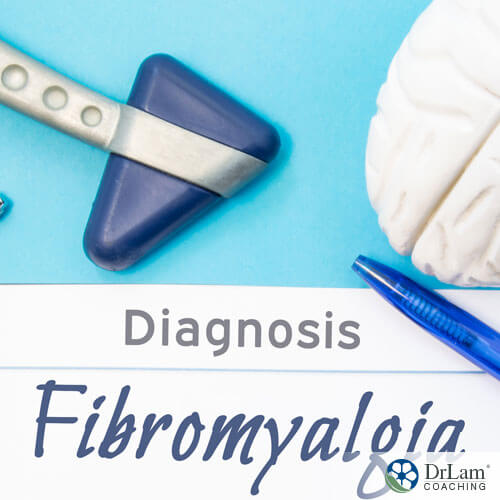 This condition is typically characterized by widespread musculoskeletal pain. Experiencing pain throughout the body accompanied with fatigue are the characteristic symptoms. The disorder can be debilitating, and it is often misidentified as arthritis, which affects only the joints.
This condition is typically characterized by widespread musculoskeletal pain. Experiencing pain throughout the body accompanied with fatigue are the characteristic symptoms. The disorder can be debilitating, and it is often misidentified as arthritis, which affects only the joints.
Some of the most prevalent symptoms associated with the condition include:
This chronic pain disorder can be associated with tenderness in the body at certain regions, referred to as trigger points, that are painful even to light pressure. The common trigger points include the knees, hips, outer elbows, upper chest, and top of the shoulders and back of the head. A consistent dull ache throughout the body that lasts for at least three months is one of the key symptoms. Pain can be experienced on both sides of the body, above and below the waist. The disorder is often associated with serotonin deficiency, increase in the volume of spinal fluid, hypersensitivity, fatigue, and disturbed sleep.
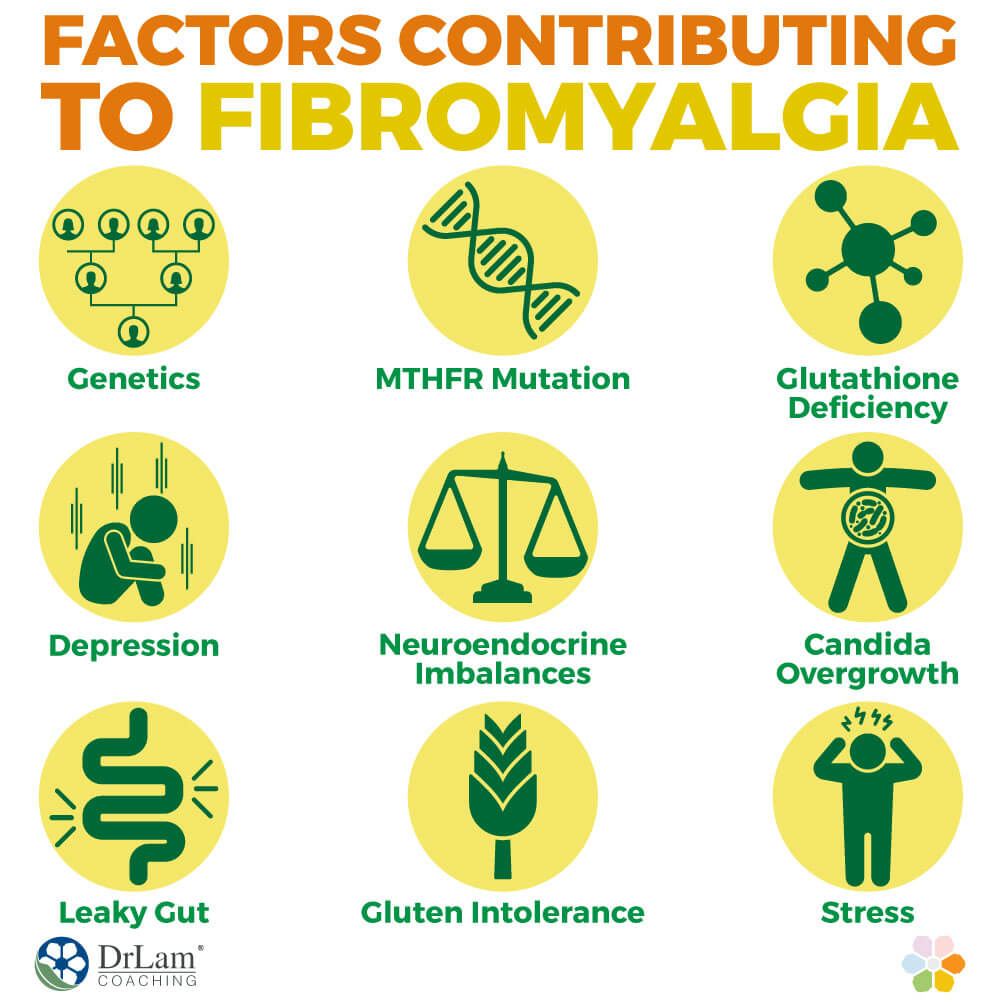
There is no definite cause for the condition. However, there are several factors that have been observed to be common among those with fibromyalgia, thus strongly suggesting certain causes.
Here are some of the factors that might lead to the condition:
In some cases, the pain disorder runs in the family genes. This makes family members more susceptible to the disorder. Researchers suggest that the condition can be due to certain genetic mutations. However, further studies are needed to identify the particular genes implicated in causing the condition.
The MTHFR mutation increases methylation processes in the body which impede natural detoxification. When the detoxification pathways are not working properly, there is an increase in toxic overload, which raises the risk of developing pain disorders.
Glutathione plays a crucial role in your body’s detoxification process. Lack of certain enzymes such as GSTM1 and GSTP1 or toxic overload can reduce glutathione production. This can affect your body’s detoxification system which, in turn, can lead to chronic pain disorders.
 Depressive disorders have been linked to increased risk of developing chronic pain conditions. As people with the condition experience chronic pain, they often tend to isolate themselves from family members and friends, increasing the chances of depressive disorders which can, in turn, aggravate the symptoms.
Depressive disorders have been linked to increased risk of developing chronic pain conditions. As people with the condition experience chronic pain, they often tend to isolate themselves from family members and friends, increasing the chances of depressive disorders which can, in turn, aggravate the symptoms.
Neuroendocrine imbalances can cause abnormalities in pain processing. This can amplify painful sensations thus triggering symptoms of the disorder. Understanding and eliminating the triggers can prove helpful in reducing the symptoms.
Candida is a fungus present in small quantities in the intestine. However, when overproduced, the fungus passes through the intestinal wall and reaches the bloodstream where it releases byproducts into your body. This can lead to various health issues including brain fog, digestive issues, fatigue, and various chronic pain disorders.
In the proper absorption of nutrients, a healthy gut flora plays a crucial role. Any imbalance in it can cause leaky gut. This reduces your body’s nutrient absorption capacity, which can raise the risk of chronic pain disorders.
Gluten intolerance could be one of the underlying causes of the disorder. Research has linked gluten intolerance with neurological issues, cognitive impairment, behavioral issues, sleep disturbance, pain, depression, and fatigue.
Stress-related disorders such as posttraumatic stress disorder (PTSD), chronic fatigue syndrome (CFS), and Adrenal Fatigue Syndrome (AFS) are found to be prevalent among people with fibromyalgia.
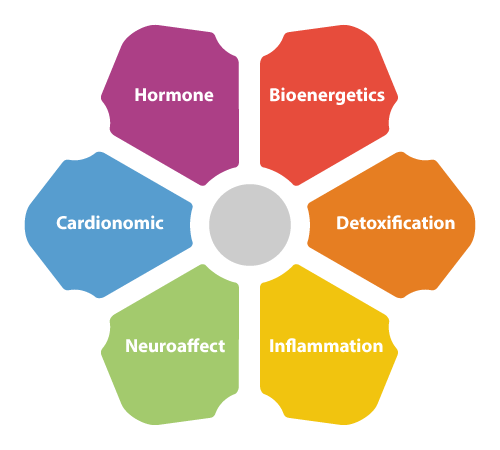 Conditions such as fibromyalgia can exert stress on your body, leaving you fatigued. The NeuroEndoMetabolic (NEM) Stress Response System is your body’s stress-fighting system. It is comprised of several organs and systems, arranged into six circuits, which function in close coordination to deal with stress. A pair of walnut-shaped adrenal glands above your kidneys is also a part of the stress response system. During stressful situations, the NEM signals your adrenal glands to secrete the anti-stress hormone cortisol. However, when stress is constant, the adrenals are forced to secrete more cortisol which can leave them overburdened. As a result, your adrenal glands are no longer in a position to secrete adequate cortisol. This can reduce your body’s natural stress-fighting capacity which can lead to adrenal fatigue.
Conditions such as fibromyalgia can exert stress on your body, leaving you fatigued. The NeuroEndoMetabolic (NEM) Stress Response System is your body’s stress-fighting system. It is comprised of several organs and systems, arranged into six circuits, which function in close coordination to deal with stress. A pair of walnut-shaped adrenal glands above your kidneys is also a part of the stress response system. During stressful situations, the NEM signals your adrenal glands to secrete the anti-stress hormone cortisol. However, when stress is constant, the adrenals are forced to secrete more cortisol which can leave them overburdened. As a result, your adrenal glands are no longer in a position to secrete adequate cortisol. This can reduce your body’s natural stress-fighting capacity which can lead to adrenal fatigue.
When you frequently experience extreme fatigue along with symptoms of insomnia, brain fog, difficulty waking up, low energy levels, constipation, depression, joint and muscle pain, stubborn weight gain, anxiety, or craving salty and fatty foods, then you could be dealing with AFS.
Fatigue, impaired cognitive function, muscle and joint pain, and increased susceptibility to infection are some of the common symptoms observed in AFS and fibromyalgia. This suggests that there could be an underlying connection between the two conditions, indicating AFS could be a contributing factor in the disorder. Therefore, focusing on AFS recovery could prove helpful in correcting the disorder.
Presently, there is no single solution for fibromyalgia. Exercise, anti-seizure drugs, pain relievers, and antidepressants are some of the methods designed to minimize the symptoms. However, medication can lead to side effects such as insomnia, anxiety, irritability, fatigue, and reduced libido, which can further exert stress on your body and aggravate the symptoms. Thus, trying natural recovery methods may be a gentler and healthier way to address your body’s overall needs, without creating any new problems.
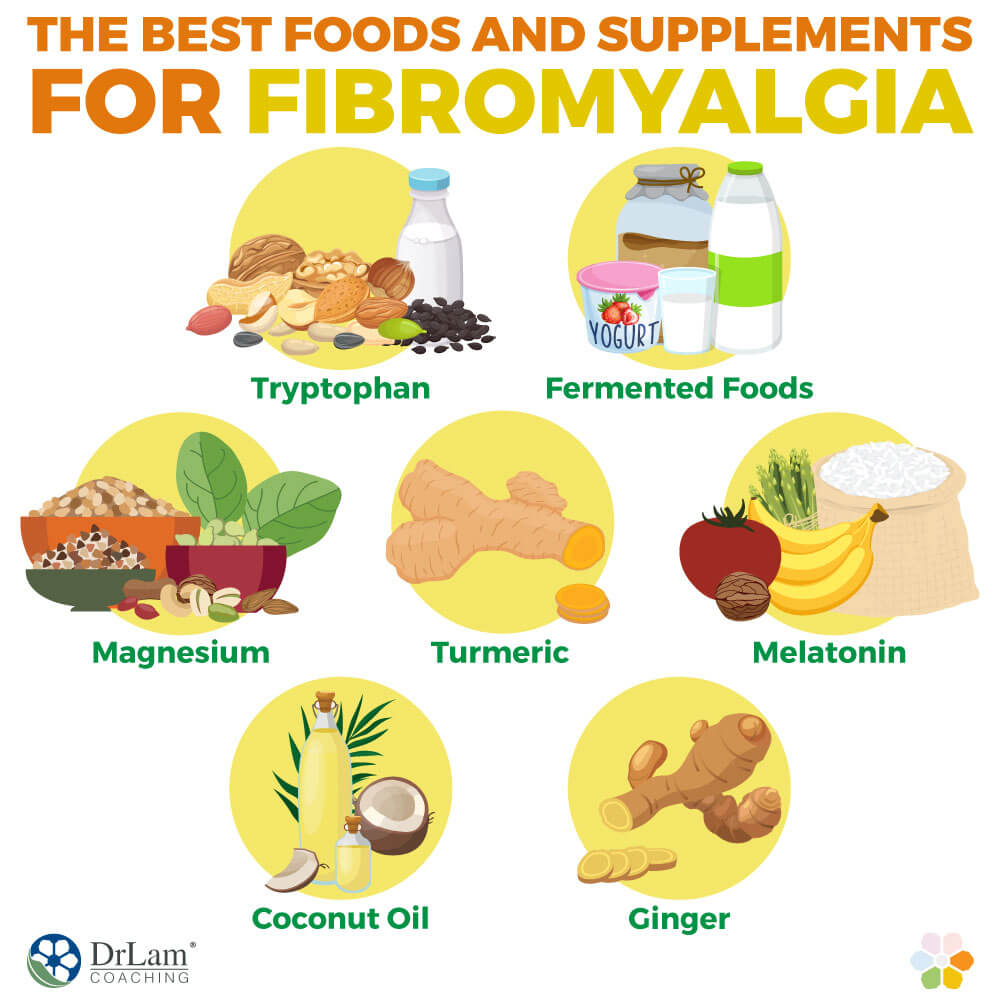
Stress and fibromyalgia are interconnected. Getting restorative sleep helps alleviate stress which, in turn, reduces symptoms of the disorder. Serotonin is known to promote restful sleep, and tryptophan is essential for adequate serotonin production. Consider including tryptophan-rich foods in your diet such as sprouted grains, sesame seeds, free-range dairy, and nuts.
Eating magnesium-rich foods has been linked to easing the symptoms of pain and discomfort. Almonds, kefir, yogurt, avocados, pumpkin seeds, and green leafy vegetables are rich sources of magnesium.
Insomnia is a prevalent symptom observed among those with fibromyalgia. Adequate production of the sleep hormone melatonin is essential for restful sleep. Top melatonin-rich foods include walnuts, rice, tart cherries, tomatoes, barley, ginger, fresh mint, red wine, banana, and asparagus. Foods rich in magnesium, folate, and zinc are also known to boost your melatonin production.
Consider swapping unhealthy fats with healthier alternatives such as coconut oil. Incorporating coconut oil into your everyday diet has been shown to help improve memory, reduce pain, balance hormones, and improve overall health.
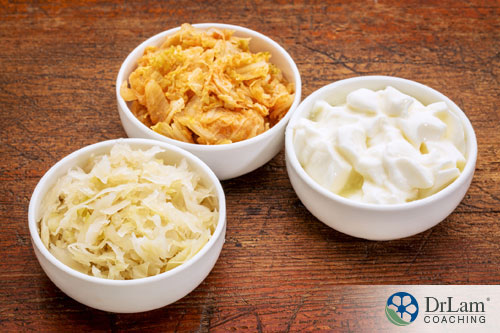
Having a healthy gut is the major requirement for a healthy body. Most of the people with this chronic pain disorder are known to have IBS. Fermented foods such as yogurt, kefir, and kombucha are known to help maintain a healthy balance of gut flora and reduce symptoms of chronic pain.
Loaded with potent anti-inflammatory properties, ginger root is a natural pain reliever. Studies show that even compared to pain and seizure medications, ginger can significantly help reduce symptoms of chronic pain.
Curcumin, a potent antioxidant in turmeric, is highly anti-inflammatory which considerably helps ease symptoms such as inflammation and chronic pain.
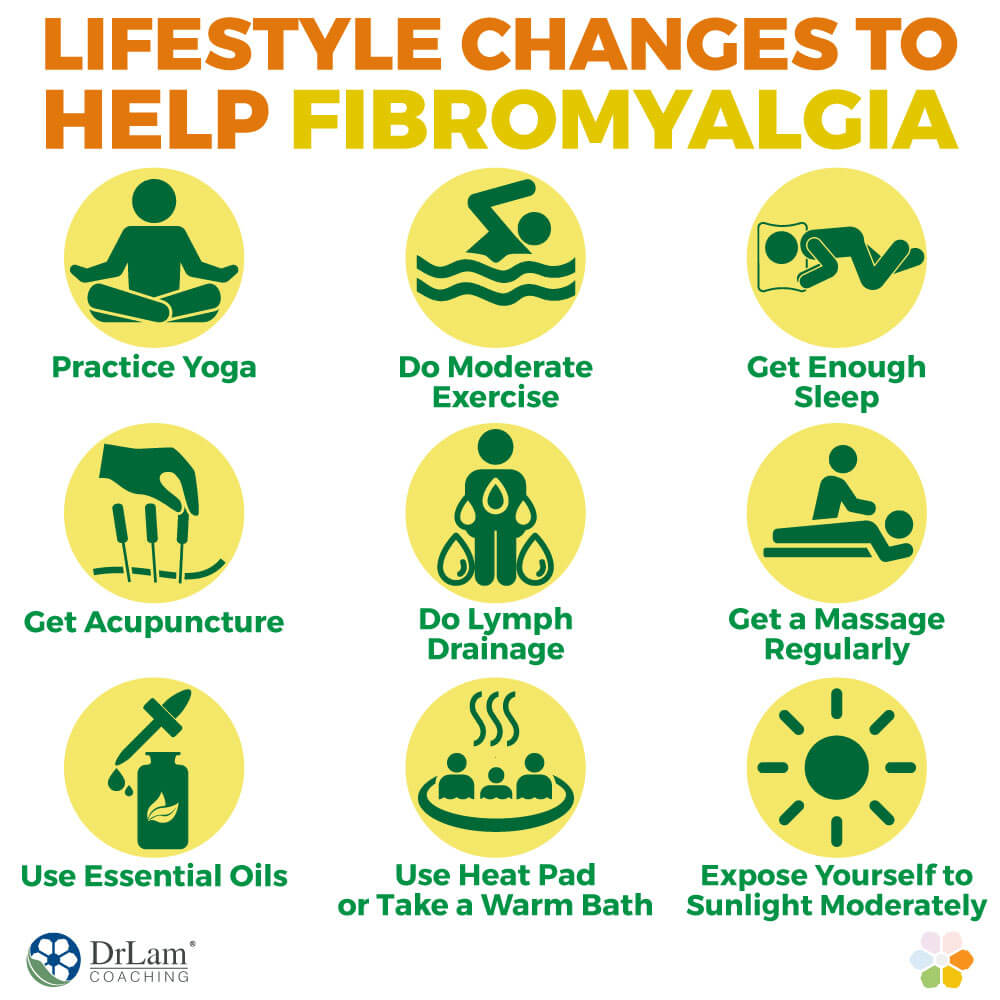
Along with nutrient-rich foods, adopting a healthy lifestyle can be very effective in relieving symptoms of pain.
Making some of these lifestyle changes can help ease the symptoms.
Yoga is known to provide immense health benefits and is considered an excellent natural remedy for correcting many health conditions and chronic pain disorders. Practicing yoga helps provide relief from pain, reduce stress, boost secretion of essential hormones in the body, and promote mindfulness.
Widespread musculoskeletal pain and the exhaustion associated with the symptoms can make you avoid exercise. However, a moderate workout such as yoga, swimming, or walking can help reduce stress and pain. Studies have link greater physical fitness levels with reduced severity of fibromyalgia symptoms.
Getting enough sleep is known to reduce symptoms of the disorder. Restorative sleep helps beat stress, relax muscles, and reduce symptoms of pain. Going to bed at the same time each night, minimizing distractions, limiting electronics and light before bedtime, and avoiding alcohol before going to bed can help promote good-quality sleep.
Acupuncture is an ancient healing practice that can provide relief from many health issues. Studies show that acupuncture can help reduce symptoms of pain. According to research, opioid peptides released during acupuncture sessions restore normal balance in the body, thus reducing pain.
Clearing toxins from the body accelerate the healing process and reduce irritation and inflammation, relieving pain. A study shows that in fibromyalgia patients, lymph drainage helps eliminate toxins by moving the lymph fluids through the body.
 Massage has been used to help relieve nearly all types of pain. Regular massage enhances blood circulation, reduces depression and anxiety, and improves range of motion for a healthier body.
Massage has been used to help relieve nearly all types of pain. Regular massage enhances blood circulation, reduces depression and anxiety, and improves range of motion for a healthier body.
The natural healing properties of essential oils are known to provide relief from several health conditions. They can help improve mood, relieve stress, enhance blood circulation, reduce muscle pain, heal nerve tissue, and improve the quality of sleep.
Application of a moist heat pad on the painful area after massaging with essential oils has been used to provide relief from pain. Warm baths can also help ease those painful muscles and joints.
Moderate sunlight exposure helps provide your body with adequate vitamin D, and the natural heat from sunlight has been used to help relieve almost all types of muscle and joint pain.
Fibromyalgia is associated with widespread musculoskeletal pain. Consistent dull aches throughout the body, along with tenderness lasting for at least three months are characteristics symptoms of the condition. While no definitive cause for the disorder has been found so far, common contributing factors include genetics, MTHFR mutation, glutathione deficiency, depression, neuroendocrine imbalances, candida overgrowth, leaky gut, gluten intolerance, and stress.
It has been observed that those with AFS and fibromyalgia experience certain common symptoms. This suggests that both the conditions are interlinked. At the root level, both are related to the NEM system of the body. Therefore, recovering from adrenal fatigue could help minimize symptoms of pain. Natural solutions can be an effective and side-effect-free way to reduce symptoms of pain disorder. Eating turmeric, ginger, coconut oil, and fermented foods, along with foods rich in tryptophan, magnesium, and melatonin can help reduce the symptoms and tenderness. Yoga, moderate exercise, lymph drainage, adequate sleep, acupuncture, massage, essential oils, applying heat, and moderate sunlight exposure are other ways to seek relief from the disorder.
© Copyright 2016-2019 Michael Lam, M.D. All Rights Reserved.
People with fibromyalgia are sometimes found to be deficient in certain vitamins such as vitamin B12, D, and magnesium. Therefore, it is important to eat foods rich in these vitamins on a daily basis. Research suggests that adequate intake of these vitamins could help reverse the symptoms.

"Please accept my best wishes"
"Hi Dorine,
Please accept my best wishes and pass them on to Leeann and Coach Justin. You are a great team! Rest assured, I am continuing with the maintenance doses on the key supplements agreed upon with Dr.Lam. I continue to warmly recommend the program to all I meet with an interest in the CFS/fibromyalgia/adrenal area.
Best wishes,
Jon"